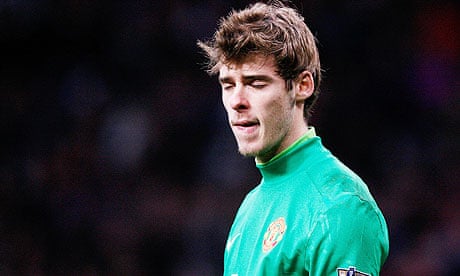The overwhelming sense when debating Manchester United's goalkeeping issue, and specifically weighing up the long-term benefits but short-term losses of entrusting a talented but still raw 21-year-old, has to be one of deja vu. We have been here already this season, after all, and the arguments became so blurred at the time all that can be said for certain is that the champions were entitled to hope we would not have to revisit the subject so quickly.
It is of whether they should continue with David de Gea in goal when it is almost inevitable, at this point in a career of otherwise great promise, that there will be further mistakes along the way, or whether they bow to the theory that a team going for the title, when every goal and every point might be vital, is not the place for a goalkeeper to be learning on the spot.
The last time this issue was raised Ferguson gritted his teeth, decided against taking the Spaniard out of the team in favour of Anders Lindegaard and most of autumn passed amid the sense that United's manager had negotiated a difficult situation with impeccable judgment.
Opposition players began to realise that peppering De Gea with hopeful, long-distance shots was now a futile exercise. The man Jamie Redknapp said needed "to grow into his kit", after a particularly harrowing league debut at West Bromwich Albion, went to the Britannia Stadium in Stoke and played as though affronted by the suggestion he was a boy among men.
A few weeks later, he turned in a performance at Anfield with all the calmness of a bomb-disposal expert, as if nobody had bothered educating him about what it meant to be beneath the Kop as a Manchester United player. Afterwards the Liverpool manager, Kenny Dalglish, shook his head ruefully and exclaimed: "I thought the press said the boy was struggling."
The ability to make reflex saves, distribute the ball quickly and accurately, and understand the angles of the penalty box is clearly in place, so we should proceed cautiously against the knee-jerk reaction in light of De Gea's recent mistakes, and not lose sight of the fact United undoubtedly knew when they recruited him from Atlético Madrid that it was simply unfeasible to assume the replacement of Edwin van der Sar would pass seamlessly.
Yet the De Gea or Lindegaard issue has resurfaced for legitimate reasons going into Wednesday's match at Newcastle United and this is not, as Ferguson put it in September, the agenda of a media "desperate for the boy to fail". Nobody in the press box invented the mistakes against Benfica and Basel that played a part in United's elimination from the Champions League. It was not a careless sub-editor who flapped at the cross for Blackburn's decisive goal at Old Trafford on New Year's Eve.
The cold, harsh reality is simply that De Gea has let in six goals where the blame, or a significant proportion of it, could be attached to him. At least three more have arrived when the culpability is less obvious but his involvement could still be questioned. That's nine in total, from 19 appearances, and even if mitigating circumstances can be presented in some cases it is still clearly too many when there are five months of the season still to play.
All this has to be balanced by the fact that De Gea has clearly improved, brilliantly sometimes, since that ordeal at The Hawthorns, when he allowed a soft shot to squeeze under his body and it was tempting to watch him throughout the rest of the match through your fingers. Yet De Gea's luck has run out lately. At the start of the season, against West Brom and Manchester City in the Community Shield, his mistakes did not prevent United winning. More recently, against Benfica, Basel and Blackburn, the results have had significant ramifications.
De Gea's occasional vulnerabilities are, of course, probably only inevitable for a goalkeeper who was 20 when he signed his £18.5m transfer in June and, to give him his due, he has probably not been helped by the absence of a consistent back four. In fact, there have been only two occasions in his first six months at the club when he has played behind the same quartet from one game to the next. Equally, a goalkeeper tends to likes consistency whereas Ferguson has been operating a rotation policy not just involving De Gea and Lindegaard but also the 21-year-old Ben Amos. After starting the first five matches of the season, there have been only two occasions when De Gea has been selected in three successive games.
Lindegaard has started five league games so far and not conceded a goal. The Dane is seven years older than De Gea and has a greater penalty-box presence. He does not lack confidence and it has been evident since the pre-season tour of the United States that he is determined to establish himself more prominently in Ferguson's thinking.
Signed from Aalesund for £3.5m last January, he has conceded an average of 0.14 goals a game. De Gea is significantly higher, at 1.37, and in all competitions has only a 74% ratio of saving shots compared with 95% for his rival. Lindegaard has a 100% catching ratio compared with De Gea's 94%. The counter-argument is that the younger man has generally been given the more difficult assignments, whereas Lindegaard has never been put against a top-six opponent.
It is a curiosity, given that Ferguson, in the days of Van der Sar, would regularly speak of his belief that the key factor for a successful goalkeeper was experience. De Gea's potential is clear but, with a soft goal conceded almost every two games, this is an education that does not come without risk.

